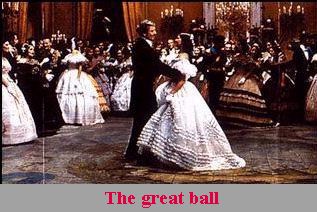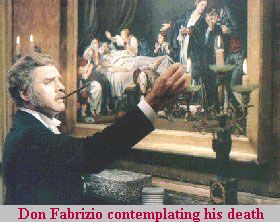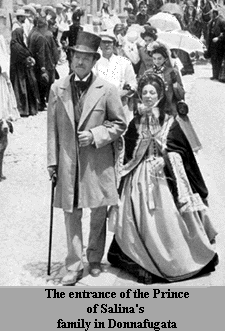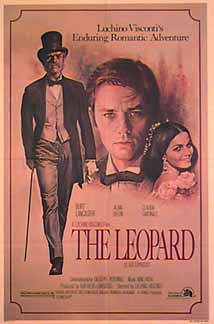 Il
Gattopardo (The Leopard)
Il
Gattopardo (The Leopard)(1963)
Director:
Luchino Visconti
Duration
195 minutes
(avoid the 165 minutes version in English)
 Il
Gattopardo (The Leopard) Il
Gattopardo (The Leopard) |
(1963) Director:
Duration
|
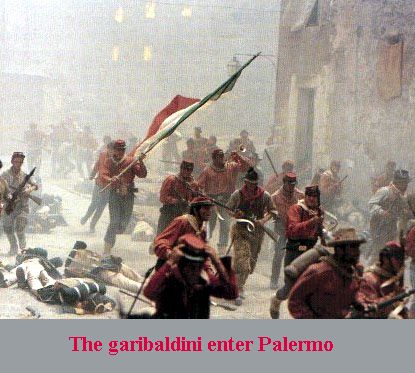 He
wants Don Fabrizio to come to the aid of the Bourbons. To Don Fabrizio
these events are irrelevant. He sees, as many Southern Italians see, the
inevitability of change and what these changes will bring. As he says “We
were the leopards, when we are gone all that is left are the jackals”.
We see the first inkling of what is to come, when the Salinas, as a privileged
class, are allowed to proceed to their latifundia in Donnafugata even though
Garibaldi’s troops have blocked the road for all others. Once the Bourbon
king is deposed, a plebiscite is held to determine whether Sicily was to
be joined to the newly formed Kingdom of Italy under the House of Savoy.
The Prince publicly endorses this. With great fanfare, the mayor of Donnafugata,
Calogero Sedara, announces the unanimous wishes of the people. This
in spite of the fact that a confidant of Don Fabrizio reveals that he had
in fact voted against the annexation. Tancredi falls in love with
Angelica, the daughter of Don Calogero, the wealthy mayor of Donnafugata
who exhibits great political ambitions, and marries her. Don Fabrizio sees
this as a great opportunity for his nephew to climb the social ladder of
the new State and declines the offer of Senator of the new Italy since
he is very skeptical that anything will change in Sicily recommending,
in his place, Don Calogero. (Lampedusa sees this as the abrogation of the
old Sicilian ruling class of their responsibilities to the new country
and the leaving of its governance in the hands of opportunists).
During a great ball, where all the Sicilian nobility attends, the personages
of the future ruling class are seen, including those who gladly shorn
the red uniform of the “garibaldini” in favor of that of the Piedmontese
army and the Colonel of the Bersaglieri whose troops shot Garibaldi at
Aspromonte in Calabria as he was preparing to continue his quest to unite
the rest of Italy. During that ball, Don Fabrizio contemplates his death
and the end of all that his society stood for. The movie ends as
Tancredi and Don Calogero feel secure in their posititions as they hear
the shots of the Piedmontese regulars executing the remnants of the “garibaldini”
captured at Aspromonte.
He
wants Don Fabrizio to come to the aid of the Bourbons. To Don Fabrizio
these events are irrelevant. He sees, as many Southern Italians see, the
inevitability of change and what these changes will bring. As he says “We
were the leopards, when we are gone all that is left are the jackals”.
We see the first inkling of what is to come, when the Salinas, as a privileged
class, are allowed to proceed to their latifundia in Donnafugata even though
Garibaldi’s troops have blocked the road for all others. Once the Bourbon
king is deposed, a plebiscite is held to determine whether Sicily was to
be joined to the newly formed Kingdom of Italy under the House of Savoy.
The Prince publicly endorses this. With great fanfare, the mayor of Donnafugata,
Calogero Sedara, announces the unanimous wishes of the people. This
in spite of the fact that a confidant of Don Fabrizio reveals that he had
in fact voted against the annexation. Tancredi falls in love with
Angelica, the daughter of Don Calogero, the wealthy mayor of Donnafugata
who exhibits great political ambitions, and marries her. Don Fabrizio sees
this as a great opportunity for his nephew to climb the social ladder of
the new State and declines the offer of Senator of the new Italy since
he is very skeptical that anything will change in Sicily recommending,
in his place, Don Calogero. (Lampedusa sees this as the abrogation of the
old Sicilian ruling class of their responsibilities to the new country
and the leaving of its governance in the hands of opportunists).
During a great ball, where all the Sicilian nobility attends, the personages
of the future ruling class are seen, including those who gladly shorn
the red uniform of the “garibaldini” in favor of that of the Piedmontese
army and the Colonel of the Bersaglieri whose troops shot Garibaldi at
Aspromonte in Calabria as he was preparing to continue his quest to unite
the rest of Italy. During that ball, Don Fabrizio contemplates his death
and the end of all that his society stood for. The movie ends as
Tancredi and Don Calogero feel secure in their posititions as they hear
the shots of the Piedmontese regulars executing the remnants of the “garibaldini”
captured at Aspromonte.
Cut, dubbed, and printed in an inferior color process, the U.S. release
of Luchino Visconti's epic didn't leave much of an impression in 1963;
20 years later, a restoration of the much longer Italian version revealed
this as one of Visconti's best.
ADDITIONAL PHOTOS
Click on thumbnail to see the full photograph
